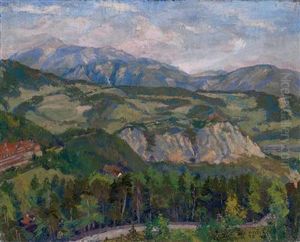Karl Cizek Paintings
Franz Cizek, also known as Karl Cizek, was an Austrian artist and educator who made a significant impact on art education, particularly for children. Born on June 12, 1865, in Leitmeritz, Bohemia (now Litoměřice, Czech Republic), which was then part of the Austro-Hungarian Empire, Cizek grew up in an environment that fostered his creative talents.
Initially, Cizek pursued a career in law but soon turned to art, studying at the Academy of Fine Arts in Vienna. His artistic talents were diverse, and he worked in various mediums, including painting, drawing, and graphic design. However, Cizek's lasting influence is most strongly felt in the realm of art education.
In 1897, he started teaching at the Vienna School of Applied Arts and began to develop his innovative ideas about art education. He believed that children possessed a natural creative ability that should be nurtured rather than molded into traditional artistic techniques. His approach emphasized free expression and encouraged children to create art without adult interference or rigid instruction. This was a radical departure from the prevailing methods of the time, which often focused on replicating established artistic styles.
Cizek established the Juvenile Art Class (Kunsterziehungsklasse für Kinder) in Vienna in 1900. This became a groundbreaking program that would later be known as the 'Child Art Movement' (Kinderkunstbewegung). His methods promoted the idea that children's art should be taken seriously and that their creative development could provide insights into psychological development.
The impact of Cizek's work extended beyond Austria. His ideas influenced art education internationally, with his methods being adopted and adapted in various countries. He also organized exhibitions of children's art, further highlighting the value of their creative expression.
Franz Cizek continued to teach and influence the field of art education until his death on December 17, 1946, in Vienna. His legacy is reflected in modern art education curricula that prioritize creative freedom and individual expression over technical reproduction. Cizek's belief in the inherent artistic ability of children continues to inspire educators and artists around the world.
